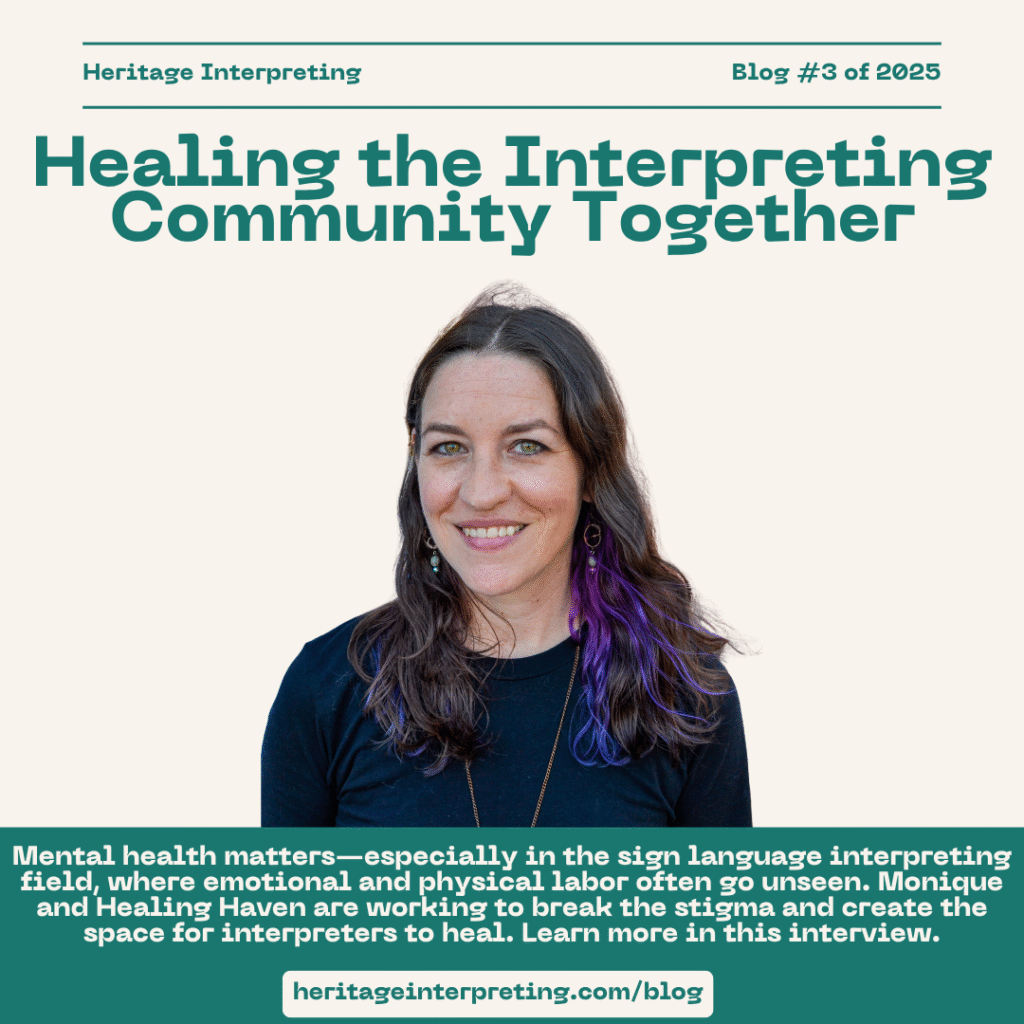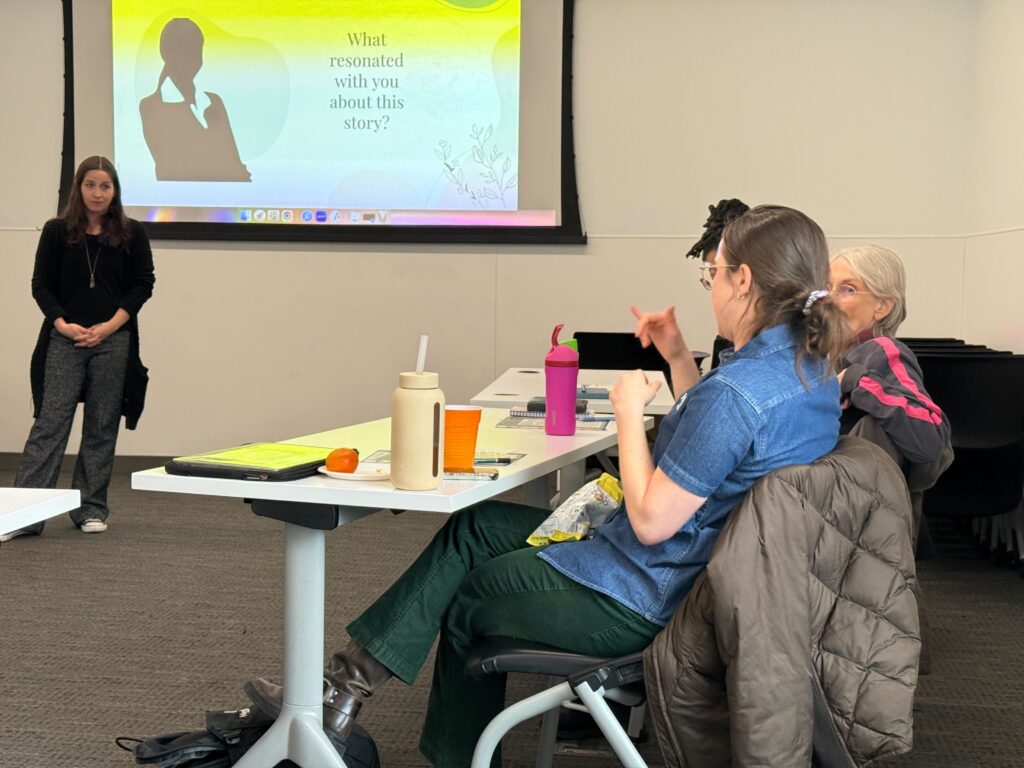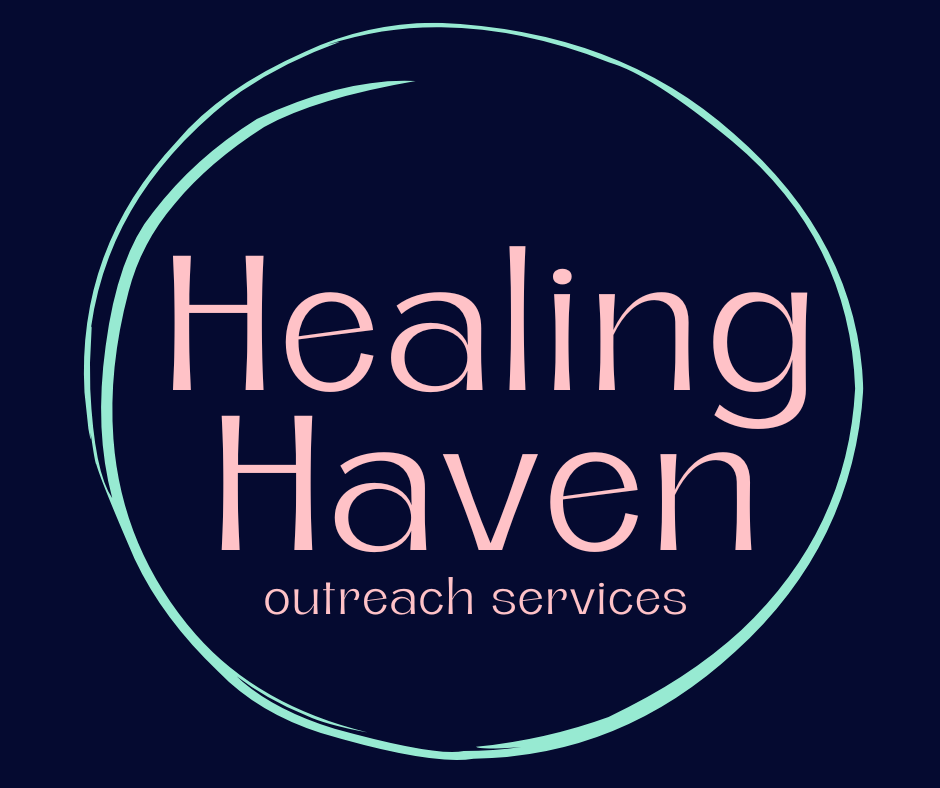
With Heritage Interpreting, we’re always looking for opportunities to showcase the important work that others are doing with the sign language interpretation field. Today, we’re honored to connect with Monique Champagne to discover the work that she has been doing with mental health and wellness in the sign language interpreting profession. Monique founded Healing Haven Outreach Services, an organization that provides tailored training and coaching opportunities to interpreters around the country. Monique’s approach is grounded in humanism, social justice, and multiculturalism, and she is passionate about empowering interpreters to navigate mental health topics and complexities in the interpreting profession with confidence and compassion. Read below to learn more!
Can you tell us a bit about your background and your connection of mental health and wellness to the sign language interpreting profession?
Yes! I’m CODA. I grew up in Texas, and I’ve been part of the Deaf community all of my life. I’ve been a sign language interpreter for over 20 years now. My family is unique: Deafness is hereditary on my dad’s side, and I’m one of the few hearing family members. My mom is Deaf, and she comes from a Hearing family of sign language interpreters. I’m actually the seventh interpreter in my family on my mom’s side.
I’ve worked in various specialities within interpreting but have a passion for working within mental health settings specifically. I’ve been involved in many aspects of the interpreting profession. I worked as a mentor, an Interpreter Training Program (ITP) professor, I was a video relay service (VRS) manager. I’ve seen a lot and experienced a wide range of roles — as an interpreter, advocate, and colleague — which gave me a firsthand view of the mental health needs of both the Deaf and interpreting communities.
My drive is to connect the gap for interpreters and mental health, both understanding their own mental health and increasing competence in interpreting mental health topics. I’m also a licensed professional counselor (LPC) in the state of Texas, and I noticed that when I work with Deaf clients in therapy, they often practice their mental health skills through the use of interpreters, like when they’re practicing assertive communication or self-advocacy. This is why I’m passionate about supporting interpreters – I truly believe we’re all on the same team to support accessibility to mental wellness of the Deaf community.
What are some of the unique stressors or emotional challenges that sign language interpreters are prone to?
The work of interpreters is inherently stressful. Interpreters experience cognitive strains and physical strains while processing information, and emotional strains because we’re seeing stress from our customers. On top of that, the demand–control imbalance in our profession contributes to stressors.
It can be distressing for us to interpret sometimes. Interpreters are at high risk for cortisol dysregulation especially in interpreting for VRS calls and K-12 environments. We know this because Dean and Pollard wrote about this in their groundbreaking study about cortisol for sign language interpreters in 2020. I’ll share the link with you to the study.
Link to the study: https://journals.sagepub.com/doi/10.1177/27523810211036238
We’re still learning about the stressors that impact interpreters. We are impacted by burnout, compassion fatigue, and vicarious trauma. We cannot be completely neutral mentally and physically. There is an imbalance because there are a lot of demands and there’s limited control in many situations. For example, we can’t choose and pick our VRS assignments, so there’s less control over our work in that setting. These factors add up over time.
Many of the workshops we offer highlight these three factors (burnout, compassion fatigue and vicarious trauma) and focus on exploring risk factors, tools to manage stressors and practices that increase interpreter resilience and longevity.
So, these are examples of what unique stressors that interpreters might be prone to.
What are some early warning signs that an interpreter may be struggling with their mental health?
A few things that stand out:
- High Expectations of Self
- Burnout
- Compassion Fatigue
- Vicarious Trauma
High Expectations of Self
We all have our own mental health journeys. And for interpreters, perfectionism can often creep in. There are days where imposter syndrome shows up, and this can sound like a lot of self doubt, even when you’ve been vetted by your agency. Other ways this can show up is when we reject compliments and positive feedback about our work or decline opportunities for fear of being exposed as a fraud. We might say, “If I cannot be perfect then I better not take these opportunities.” This could be one warning sign that we need to get support.
Burnout
Burnout happens when you have too many demands and not enough controls at work. You may feel absolutely overwhelmed, exhausted, and unable to manage work stressors over time. Burnout happens slowly gradually and it can build up over time. Because it’s a slow process, it can be hard to realize that you’re burning out. One day you might realize that you just feel stuck.
Here’s what you could do to address the warning signs of burnout: analyze what your work demands are — like asking yourself if you’re taking too many jobs that are sensitive and stressful. If you notice you have had many high-stress assignments, it may be time to switch things up and take on less complex jobs and low-stake assignments for a while. The hope in managing burnout is to find the balance in the work you are committing to. Be honest and intentional with yourself. If you start to notice signs of burnout, it may be time for you to look at your schedule and start to make some changes.
Compassion Fatigue
As interpreters, we bear witness to and are exposed to our clients’ stories, their experiences of suffering, their struggles, experiences of discrimination, oppression, microaggressions and audism, both directly and indirectly. Over time this can be exhausting. We may not even realize that we are starting to internalize these things emotionally and mentally. We might become overattached with the struggles of our consumers and start to feel their pain. Sometimes we start to become numb in order to manage these emotions, and we might start interpreting as if we’re on autopilot.
So basically, when we become too overattached or numb, then that’s compassion fatigue. The good news is that developing compassion satisfaction actually protects us from vicarious trauma. Compassion satisfaction is the belief that our work has a positive impact on our clients and our community. When we are experiencing compassion fatigue, we might start to think that our work doesn’t matter. If we can practice healthy detachment after assignments and also recognize the positive influence of our work, we can increase our experiences of compassion satisfaction, which help us stay in the field for longer.
It’s important to share this caveat: our mental health toolkit needs refreshing frequently. We may find that a coping skill we used in the past doesn’t work anymore. This is a normal part of our mental health journey. If we are noticing that our old tools aren’t working anymore, it could be time to revisit our resources for managing stress.

How does vicarious trauma manifest in this profession?
Where burnout and compassion fatigue slowly creep in over time, vicarious trauma usually happens after that one assignment. Vicarious trauma can happen when we have been witness or are exposed to others’ traumatic experiences and we start to take on the stress of our consumers. It can really have a negative impact on us, both personally and professionally.
There are a few signs to look out for interpreters to look out for. Rumination – this might feel like a lack of control over your thoughts or noticing memories or images popping up from previous assignments. You might feel more sad, more numb, more fearful, and/or more angry. And physically you might notice more stomachaches and headaches. You may notice yourself not feeling hungry or feeling more hungry than is typical for you. Also, you may notice that you sleep less or oversleep. These are all signs that your body, mind, and emotions have been negatively impacted by exposure to distressing material.
Debriefing (in an ethical, confidential and safe space) can be an extremely helpful tool in addressing vicarious trauma and determining the best next steps. If you feel especially struck by assignments because they mirror your lived personal experiences, then this could be a sign that you need space for your own personal processing, more geared towards therapy support for help unpacking your own lived experiences.
[Note: This was during our conversation off of the record, but we (Monique and Trey) agreed to add this part in this as we think this is a rather important point to make.]
Trey (interviewing): What about triggers?
Monique: I prefer to use “activate” as a term (activation of the nervous system, as known as “fight, freeze, flight”) than to use “trigger” as a term. When I feel activated, it can be a signal for me to get help or support. The term “triggered” is often overused and sometimes viewed as a negative thing, like there’s something wrong with us when our bodies respond to distress. It’s more about reframing the concept of stress response in a healthier way.
So, there are two important things I want to add to this discussion about vicarious trauma. Babetta Popoff once said this and it has stuck with me: “Interpreters are first responders who can’t respond.”
Link to the quote (and the article): https://streetleverage.com/2017/06/self-care-sign-language-interpreters-8-ways-to-ease-trauma/
We often minimize our experiences as we sometimes think “this isn’t about me,” as we are just doing our jobs. But this isn’t true. It does affect us. The pain is real. In the moment, it is our job to complete the assignment/call/conversation, but it is also our responsibility to navigate and mediate the impact on us as humans.
Unfortunately, the impact of vicarious trauma doesn’t go away on its own, so I want to discuss some possible solutions. First of all, we need to get help. We can’t recover from vicarious trauma alone.
If you feel comfortable, talk to your trusted peers. Share your experiences with them, or talk to your supervisors, mentors, or therapists, keeping discussions focused on the impact on our own experiences (not on consumer information). It is paramount to make space to unpack what is happening within ourselves so that we can continue to do this work ethically and responsibly. Of course, everything we discuss will need to be confidential, we can still share our thoughts without identifying too much about our clients and their stories. By talking about the impact of our work, we can start to reduce the impact of vicarious trauma.
Random fun fact: Some research shows that playing Tetris actually might help reduce signs of vicarious trauma – yes, the video game! The research has shown that if you play Tetris shortly after exposure to a traumatic event, it could reduce your experiences of intrusive memories. [Note: Trey asked why she thinks this is the case]. They are still analyzing this phenomenon and they’re figuring out how it works, but I think it helps our brains file away our experiences. while we are distracted playing the game. Our thoughts can get muddled and tangled up fresh off a sensitive or traumatic assignment, so I suspect the game might help us file away the information in a way that allows us to continue on with our work.
Resources
- Can Tetris help reduce or prevent PTSD? Link to the study: https://theconversation.com/can-playing-tetris-help-prevent-ptsd-if-youve-witnessed-something-traumatic-226736
- Can Playing the Computer Game “Tetris” Reduce the Build-Up of Flashbacks for Trauma? A Proposal from Cognitive Science: https://journals.plos.org/plosone/article?id=10.1371/journal.pone.0004153
Do you think the sign language interpreting profession has a culture that supports open dialogue about mental health? Why or why not?
In general, I’d say that our society is understanding more and more about mental health and becoming more accepting. We’re talking more and more about mental health and sharing tools to support each other. But there’s still a stigma around mental illness, and we’re still working to challenge this stigma. I think this same idea is also reflected in our profession. It can be a really lonely job — if you’re struggling with your mental health, you might feel even more alone. And I think some of us privately worry that if we ask for help, it could be perceived as being unqualified for the job and therefore negatively affect future professional opportunities.
It could be that interpreters are nervous about disclosing mental health struggles and being vulnerable with others. But we heal by connecting with others, through being seen and understood. So, this stigma is harmful and ultimately damaging to the profession.
I think we’re starting to open up the discussion more. I see many more conversations about the intersection of interpreting and mental health. There’s always more work to do to understand mental health. This is a profession where we are lifelong learners, and information keeps growing everyday with more research and studies on these important topics. It’s all a journey.
What can sign language interpreting agencies or freelance networks (like fellow colleagues or interpreter friends) do to better support mental health and wellness in the field?
Basically, let’s talk about it. Create space for each other. Isolation often makes mental health worse. Burnout, compassion fatigue, and vicarious trauma thrive in isolation.
I’ll share my answers in two ways – one for interpreting agencies and another for peers, colleagues, and people in our networks.
As for agencies… in an ideal world, people running agencies would be trained and informed in the best practices how to face stressors that interpreters deal with in their daily work such as providing tools and resources on what interpreters can use to support in their work. Being familiar with a trauma-informed framework, being prepared to provide preventative measures, and creating space for debriefing opportunities for interpreters without question. We need to normalize these types of professional standards. Agencies can provide resources, referrals, and debriefing opportunities to their interpreters to better support their mental health. Some employers even offer Employee Assistance Programs (EAPs) to their interpreters, which often provides free counseling sessions as a benefit to being an employee of the company.
If we feel supported by our agencies and supervisors, we’re less likely to be affected by vicarious trauma. That is, the impact of interpreter vicarious trauma can likely be reduced (reduction of negative signs or length of impact shortened) by having leadership engage in a trauma-informed lens of support. On top of that, increased mental health support often leads to less turnover and therefore less cost for replacing, retraining and onboarding new interpreters and employees. Providing these types of resources can actually positively affect the bottom line of an interpreting business.
Leaders, supervisors, and agencies can check in with their interpreters, both novice and seasoned interpreters. Listen to their concerns, their feedback and aim to support their wellness in general. And provide resources and tools that interpreters can actually use — knowing that agencies have their backs can have a hugely positive impact on interpreters.
As a peer or colleague, we never know what someone else is struggling with. I want to encourage us to always try to assume positive intent. If someone seeks support from you and discloses their own struggles, be supportive, nonjudgmental and encouraging (within your own healthy limits). When we connect with others, then we’re starting to normalize the idea that everyone struggles. Everyone’s nervous system experiences activation to stress. Colleagues can provide resources and share referrals. It’s important to know your own boundaries, though. Sometimes we can encourage someone to seek additional support. I believe that everyone deserves space for healing, whether that is through a positive peer relationship, community support, or in a more formal healing space like therapy.
Basically, let’s talk about it. Create space for each other. Isolation often makes mental health worse. Burnout, compassion fatigue, and vicarious trauma thrive in isolation. If you notice that someone you care about might be isolated… reach out to them. Drop a text and say hello. Being intentional and making connections will help you continue in this work for a long time. Being part of your community can help uplift and heal you.

What wellness practices or coping strategies do you recommend to interpreters to take care of their mental health and maintain emotional balance?
First, it’s important to identify each of these factors: burnout, compassion fatigue, and/or vicarious trauma. Dr. Dan Siegel coined the phrase “if we name it, we can tame it” to represent the power of simply labeling our struggles.
Again, I want to emphasize – this is a lifelong journey. Some tools work for a while and then suddenly they no longer work, and that’s perfectly normal. It’s all part of your journey. I encourage you to actually write down your coping tools (in a journal, in an electronic document). Reflect on your tools often. I recommend documenting them because when you’re in a stressful situation, you may have a hard time remembering what coping tools to apply. And be sure to adapt your list from time to time when you notice these tools aren’t as effective as they used to be.
Now, there are three categories that I like to approach for coping strategies when you’re about to go out for work: before assignments, during an assignment, and after assignments.
Before going into work, I recommend utilizing a grounding technique. This might look like walking barefoot on the grass. Any activity that helps you feel grounded and reminds you that you are present. Grounding activities have a calming effect, which can help you feel more connected to your own experiences before you go to work. You can start your assignment with a more regulated (not activated) nervous system.
If you feel stress creeping in slowly during the assignment, try micro-self-care activities like deep breathing or feeling an “anchor item” in your pocket (such as a stone or a toy designated to bring a sense of calm) can help you feel connected to the task at hand again.
After assignments (great job, you did it!), utilize transition activities. For example, I have a sweater that I only use when I’m interpreting. When I wear this specific sweater, I know I’m ready to interpret. When the assignment is done, I take it off and that action sends a signal to my body that I’m off duty and it’s time for me to live my personal life. It kinda reminds me of Mr. Rogers – you always see him wear a specific cardigan and pair of shoes when it’s time for him to start the show as a reminder that he is entering a different space. On top of that, when I clean my interpreting sweater, I imagine all the stress that has stuck to me is getting washed away. Transition activities like that can help. Another idea is to listen to specific music after an assignment, whether it is calming or energizing (depending on what you need).
Our brains love routines. If you can implement routines into your daily schedule, I strongly encourage it. For example, I like to drink coffee on the porch every morning, so my brain knows that I have something to look forward to (that’s stable and predictable) every day. These types of routines can help with the stress of unexpected things happening in the profession because we know that we have something to look forward to when it’s all over. You can even add in routines to celebrate completion of a difficult assignment.
Body scans also can be beneficial. A body scan is a tool that helps you make space to just feel your body out. When you let your body be, you may notice things appear–such as a sore wrist or tense shoulders or heavy breathing. A body scan can help us identify possible stressors in our body before and/or after assignments. It can help you identify your pain points. And also recognize when you’ve taken on stress that isn’t yours.
I like to think of resilience as sunscreen for your mental health. All of these activities are ways to increase our resilience and increase longevity in this field.
Also, on a side note, I love sticky notes! Post-its are the best brand honestly – they stick better than other brands, ha! I recommend writing down positive affirmations somewhere you will see them daily. It’s easy to get lost in the daily shuffle, so these little notes can help support ourselves throughout the day. Another example would be to add an affirmation to your phone wallpaper, or make your password a version of an affirmation (i@mStR0nG, for example). If we notice we are becoming desensitized to the affirmation, it’s time to change it up to keep it fresh in our minds.
Of course, Healing Haven Outreach Services is a fantastic place for interpreters out there to connect with! But are there any tools, apps, or resources for interpreters that you have found especially helpful for mental wellness?
A little bit about our work at Healing Haven Outreach: We offer ongoing opportunities for workshops and training for interpreters interested in learning more about mental health. We also offer confidential and ethical debriefing and consultation opportunities for interpreters and interpreting agencies. We strongly believe that interpreters deserve mental health support (both interpreting mental health topics in our work and our own experiences of mental health).
In general, I recommend creating a comprehensive toolkit that feels most comfortable and right for you. It also should be flexible and customizable as I said earlier – tools might become more or less effective over time.
I really like the Finch App. On the app, you’ll customize self-care tasks, and when you complete these tasks, the app gives you points where you can add to your bird’s home and buy fun clothing items. For example, a task that I aim to check off everyday is to drink water. So, Finch reminds me to drink water and when I do it, I get the satisfaction of checking off this self-care item and to buy cute items for my bird friend! The gamification of the app is useful and it encourages you to complete things to get rewards.
Tetris is another good resource, as I already touched on this earlier in this interview.
If you’re not sure if you have experienced vicarious trauma, you can take an online assessment called the Professional Quality of Life – and in 10 minutes, you’ll find out if you are experiencing burnout, compassion satisfaction, and/or vicarious trauma. One thing I want to be mindful of is that this is an assessment that measures vicarious trauma for various “helping” professions, any job that routinely has high-risk events such as being a firefighter, an emergency medical technician, and so on. So when you take this assessment, you’ll want to replace the word “help” with “interpret” to get more accurate results.
The link to the survey is here. (Link: https://proqol.org/proqol-measure)
As for books, I really enjoy the work of Dr. Kristin Neff. Her book, Self Compassion: The Proven Power of Being Kind to Yourself, uses science to describe the positive impact of self-compassion. One example of the benefit of self-compassion is that our self-critique can actually take up your space in the executive functioning portions of our brain – which is the same part of the brain we need to be an effective interpreter. I highly recommend this resource. They also have a survey you could take for a self-assessment.
Link to the survey: https://self-compassion.org
Bottom line – find what works for you. You’ll want to try new things to add to your toolkit often. Ask your friends what they use, what books they read that are helpful, what workshops they’re taking. I’m always learning new tools – the ones I mentioned above are among my favorites!
Do you think interpreter training programs (ITP) do enough to prepare students for the mental health impact and emotional demands that interpreters may face in the field?
ITPs are geared towards training students to be prepared to be effective interpreters. Students learn hard skills that make them qualified to be out in the field. I think we often overlook the value of discussing mental health perspectives in ITPs. Emerging interpreters need tools to practice regulating their emotions and thoughts, especially after difficult assignments. Creating spaces for debriefing (ethically, of course) would definitely help reduce student distress. These debriefing sessions could help them recognize the warning signs of burnout, compassion fatigue, and vicarious trauma ahead of time. If we can catch signs early, then we can reduce the impact of it. There’s a lot of potential for incorporating “soft skills” in ITPs, like encouraging students to develop their own mental health toolkit and relevant resources.
If you could share one piece of advice to interpreters who may be struggling but don’t know where to start, what would it be?
This work can be super isolating. One of the most important pieces of advice I have is to connect with others. Talk to someone you trust. Relationships can be healing. Try to make an effort to reach out for support. When we struggle, we tend to isolate ourselves. But we really need to do the opposite: Get help.
The second thing is to connect with yourself. We give so much compassion to others. Don’t forget to have compassion for yourself. It can be easy to be critical of our work, especially since our job is so important – to provide access to information. But I want to encourage you to start to recognize and challenge unhelpful thoughts. It’s easy to be kind to ourselves when we’re having a good day. But it’s more important to be kind to ourselves when we’re struggling. When we are more compassionate with ourselves, it increases our capacity to be kinder to others around us.
Another important aspect of self-care as an interpreter is to have healthy personal and professional boundaries. It can be helpful to identify aspects of your role that are within your control and parts that are outside of your control (balance demands and controls). Many interpreters consider their career to be an important part of their life, but remember that your job doesn’t represent you as a whole person. Find a way to connect with who you are as a person, outside of your role as an interpreter. Reach out to your local communities. Volunteer at your library. Get involved with bake sales or host game nights with your closest friends. Engage in joy outside of your interpreting work. This practice in personal wellness helps us gain a sense of autonomy and control over our personal lives, which has a positive impact on our demand-control balance at work. Being intentional with your personal life helps balance the stress of working within the interpreting profession.
[Also another off-the-record conversation that we agreed to publish here.]
Trey: I always thought you should get therapy only when things are wrong, but I was wrong. It’s helpful to get therapy even if everything’s going just fine.
Monique: Yes, exactly. That’s a great example of the stigma against mental health support. It can be really helpful to start meeting with a therapist when everything’s “ok” for a few reasons. Seeing a counselor can help prevent a build up of work stress. Finding the right provider in the first place can be a challenge. First, we need to locate a provider that fits our criteria: like someone you have good rapport with, someone whose schedule matches yours, and someone who takes your insurance or whose services are within your budget. If we wait to seek counseling when we’re struggling, we may find it challenging to get the support we need when we need it.
In conclusion, interpreters work with Deaf people, a community that has been historically marginalized and oppressed. We are responsible for providing communication access, which often means being exposed to and bearing witness to stories of trauma or distress. Our communities are interconnected – the more we prioritize mental health within our interpreting profession, the more efficient and effective our work will be, which will have a positive ripple effect on our Deaf community members by improving the provision of accessibility services. I truly believe that we’re all in this together.

Monique Champagne is the founder of Healing Haven Outreach Services. Healing Haven Outreach Services’ mission is to equip interpreters with the tools and resources they need to navigate the complexities of mental health in their profession. With a focus on empowerment and development of skills and expertise, Healing Haven Outreach Services offer a range of services including workshops, coaching, group sessions, and organizational support. Click here to learn more about Healing Haven Outreach Services. Check out their Instagram page to discover more!
Link to Healing Haven Outreach Services’s website: healinghavenoutreachservices.com
Healing Haven Outreach Services’s Instagram page: instagram.com/healinghavenoutreach

